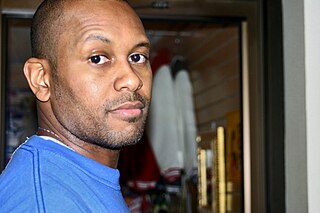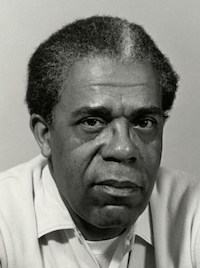
Spoken word refers to an oral poetic performance art that is based mainly on the poem as well as the performer's aesthetic qualities. It is a late 20th-century continuation of an ancient oral artistic tradition that focuses on the aesthetics of recitation and word play, such as the performer's live intonation and voice inflection. Spoken word is a "catchall" term that includes any kind of poetry recited aloud, including poetry readings, poetry slams, jazz poetry, and hip hop music, and can include comedy routines and prose monologues. Unlike written poetry, the poetic text takes its quality less from the visual aesthetics on a page, but depends more on phonaesthetics, or the aesthetics of sound.

The Black Arts Movement (BAM) was an African American-led art movement that was active during the 1960s and 1970s. Through activism and art, BAM created new cultural institutions and conveyed a message of black pride. The movement expanded from the incredible accomplishments of artists of the Harlem Renaissance.

Kevin Powell is an American writer, activist, and television personality. Powell is the author of 14 books, including The Education of Kevin Powell: A Boy's Journey into Manhood and When We Free the World published in 2020. Powell was a senior writer during the founding years of VIBE magazine from 1992 to 1996. Powell's activism has focused on ending poverty, advocating for social justice and counteracting violence against women and girls through local, national and international initiatives. He was a Democratic candidate for the United States House of Representatives in Brooklyn, New York, in 2008 and 2010.

Dudley Randall was an African-American poet and poetry publisher from Detroit, Michigan. He founded a pioneering publishing company called Broadside Press in 1965, which published many leading African-American writers, among them Melvin Tolson, Sonia Sanchez, Audre Lorde, Gwendolyn Brooks, Etheridge Knight, Margaret Walker, and others.
Jazz poetry has been defined as poetry that "demonstrates jazz-like rhythm or the feel of improvisation" and also as poetry that takes jazz music, musicians, or the jazz milieu as its subject. Some critics consider it a distinct genre though others consider the term to be merely descriptive. Jazz poetry has long been something of an "outsider" art form that exists somewhere outside the mainstream, having been conceived in the 1920s by African Americans, maintained in the 1950s by counterculture poets like those of the Beat generation, and adapted in modern times into hip-hop music and live poetry events known as poetry slams.
Jayne Cortez was an African-American poet, activist, small press publisher and spoken-word performance artist whose voice is celebrated for its political, surrealistic and dynamic innovations in lyricism and visceral sound. Her writing is part of the canon of the Black Arts Movement. She was married to jazz saxophonist Ornette Coleman from 1954 to 1964, and their son is jazz drummer Denardo Coleman. In 1975, Cortez married painter, sculptor, and printmaker Melvin Edwards, and they lived in Dakar, Senegal, and New York City.
Russell Simmons presents Def Poetry, better known as simply Def Poetry Jam or Def Poetry, is a spoken word poetry television series hosted by Mos Def and airing on HBO between 2002 and 2007. The series features performances by established and up-and-coming spoken word poets. Performances also include special appearances by well-known actors and musicians, as well as occasional performances by Mos Def himself. Co-created by Bruce George, Danny Simmons, Deborah Pointer, Stan Lathan, and Russell Simmons, the show is a spin-off of the popular Def Comedy Jam which began airing on HBO in the 1990s. As with Def Comedy, Simmons appears at the end of every episode to thank the audience.
A Black Mass is a play written by Amiri Baraka and performed at Proctor's Theatre in Newark, New Jersey in 1966. Baraka also recorded a version of the play with Sun Ra's Myth-Science Orchestra in 1968. The play is based on the religious doctrine of Yakub as taught by the Nation of Islam, and it describes the origin of white people according to this doctrine.

Political hip hop is a subgenre of hip hop music that was developed in the 1980s as a way of turning hip hop into a form of political activism. Political hip-hop generally uses the medium of hip hop music to comment on sociopolitical issues and send political messages to inspire action, create social change, or to convince the listener of a particular worldview. It was inspired partially by politically-focused 1970s artists such as The Last Poets and Gil Scott-Heron, as well as the Black Power movement and revolutionary politics of the 1960s and 1970s. Various hip hop artists emerged in the 1980s espousing political messages and providing social and political commentary, with the American group Public Enemy in particular establishing themselves as one of the first predominantly political hip-hop groups. The genre has helped to create a new form of social expression for subordinate groups to speak about their exclusions, injustices and lack of power.

Larry Neal or Lawrence Neal was a scholar of African-American theatre. He is well known for his contributions to the Black Arts Movement of the 1960s and 1970s. He was a major influence in pushing for black culture to focus less on integration with White culture, to that of celebrating their differences within an equally important and meaningful artistic and political field, thus celebrating Black Heritage.

Amiri Baraka, previously known as LeRoi Jones and Imamu Amear Baraka, was an American writer of poetry, drama, fiction, essays and music criticism. He was the author of numerous books of poetry and taught at several universities, including the University at Buffalo and Stony Brook University. He received the PEN/Beyond Margins Award in 2008 for Tales of the Out and the Gone. Baraka's plays, poetry, and essays have been described by scholars as constituting defining texts for African-American culture.

The Nuyorican Poets Cafe is a nonprofit organization in Alphabet City, on the Lower East Side of Manhattan. It is a bastion of the Nuyorican art movement in New York City, and has become a forum for poetry, music, hip hop, video, visual arts, comedy, and theater. Several events during the PEN World Voices festival are hosted at the cafe.
The Poet Laureate of New Jersey was an honor presented biennially by the Governor of New Jersey to a distinguished New Jersey poet. Created in 1999, this position existed for less than four years and was abolished by the legislature effective July 2, 2003. When the New Jersey State Legislature created the laureate position, the bill provided specifically for the creation of an award named in honor of twentieth-century poet and physician William Carlos Williams (1883–1963) who resided in Rutherford, New Jersey. However, the legislature recognized that the award's recipient would "be considered the poet laureate of the State of New Jersey for a period of two years." Before the position was abolished, only two poets, Gerald Stern and Amiri Baraka, had been appointed as the state's poet laureate.
Marcel Diallo is an American musician, poet, artist and community builder, known for his founding of the Black Dot Artists Collective, The Black New World and his revitalization efforts in West Oakland's historic, predominantly African-American Prescott neighborhood aka the Lower Bottoms.
Askia Muhammad Touré is an African-American poet, essayist, political editor, and leading voice of the Black Arts Movement. Toure helped to define a new generation of black consciousness by creating a triumphal identity for the purpose of uplifting the African heritage beyond the oppressive ideas that dominated the time.
Michelle T. Clinton is an American poet.
Political poetry brings together politics and poetry. According to "The Politics of Poetry" by David Orr, poetry and politics connect through expression and feeling, although both of them are matters of persuasion. Political poetry connects to people's feelings, and politics connects to current events. Poetry can also make political references and have real effects on the perception of politics.
Amina Baraka is an American poet, actress, author, community organizer, singer, dancer, and activist. Her poetic themes are about social justice, family, and women. Her poetry has been featured in anthologies including Unsettling America (1994). She was active in the 1960s Black Arts Movement, as an artist.

Sonny's Time Now is an album by American free jazz drummer Sunny Murray, his first as a leader. It was recorded in New York City on November 17, 1965 and first released on LeRoi Jones' Jihad label. It was later reissued on the DIW and Skokiaan labels.
Laini (Sylvia) Abernathy was an American artist and activist. She was an important figure in Chicago's Black arts movement, often working in collaboration with her husband, photographer Fundi (Billy) Abernathy.








